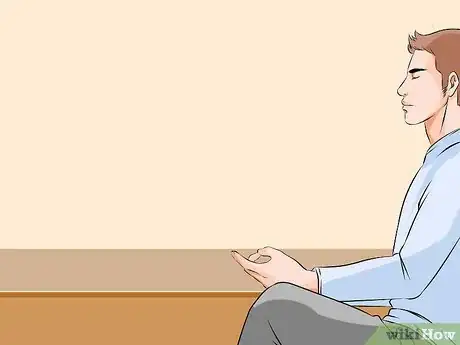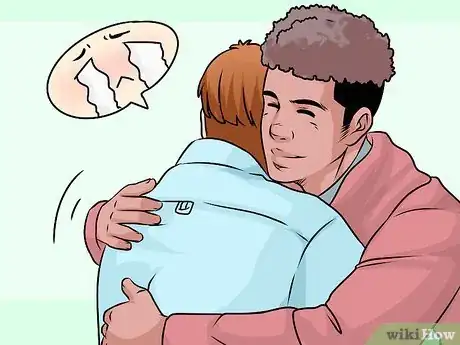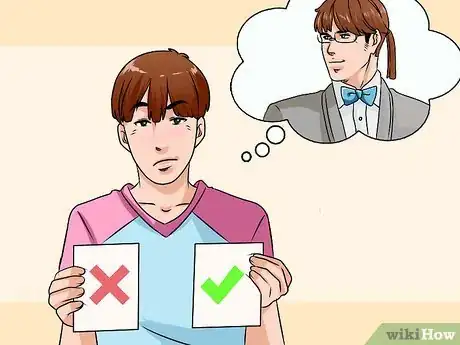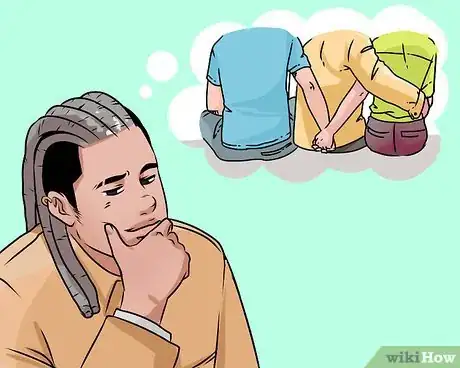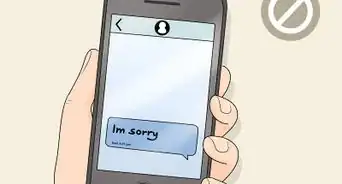This article was co-authored by Nancy Lin, PhD. Dr. Nancy Lin is a Licensed Clinical Psychologist and the Owner of Go to Sleep San Diego, a private practice providing therapy for people suffering from insomnia, trauma, depression, and related problems. She is also trained in issues related to cultural diversity in mental health. Dr. Lin holds a Bachelors degree in Psychology from The University of California, Berkeley and a Masters degree in Medical Anthropology from the University of London, SOAS. She earned her Ph.D. in Clinical Psychology from The University of Massachusetts Boston and completed an APA-accredited internship and postdoctoral training at the VA San Diego Healthcare System (VASDHS).
There are 9 references cited in this article, which can be found at the bottom of the page.
wikiHow marks an article as reader-approved once it receives enough positive feedback. This article received 19 testimonials and 100% of readers who voted found it helpful, earning it our reader-approved status.
This article has been viewed 355,360 times.
It can be hard making friends and even harder to trust them. For some people, it can also be difficult to find someone who really loves you and cares about you. Ideally, a good friend will offer love and respect and will never betray you. But unfortunately, not everyone is like that. The hard truth is that sometimes people--even best friends--betray each other. But it's so important, yet such a struggle, to learn how to forgive and move on. Thankfully, though, it's not impossible.
Steps
Understanding What Happened
-
1Ask yourself if it was a misunderstanding. It's easy to get upset when you think that someone close to you has betrayed you. That being said, you need to be sure that a betrayal has actually taken place. Perhaps it was not your friend's intention to act disloyal. Make sure he or she has really done something wrong.
- What was your role in the incident? Could you have made an assumption that led to a misunderstanding or upset?
- Find out what really happened. Ask third-parties who may know what happened for more information.
- Consider all the information including your own. If your friend really has done something wrong, has he or she admitted wrongdoing?
- Of course, a confession is not the only evidence of guilt, but it should be taken into consideration. Otherwise, you have to consider the possibility of a misunderstanding. This is not to say that all guilty people confess. Many don’t. So consider all the evidence, and make a decision about what to do next if a betrayal has occurred. [1]
- For instance, if you told a secret and suddenly everyone knows your secret, then you'll probably suspect your friend of betraying you. Ask your friend if he or she intentionally told someone. Was it an accident? Did it just slip out?
-
2Ask yourself how the other person feels. If your friend is just as upset as you are, maybe you should understand your friend’s perspective. Try to put yourself in your friend’s shoes. Could you have said something that was misinterpreted by your friend, or vice versa?
- You also have to understand that you don’t know what is going on in a person’s life. So, you have to look at the incident from the other person’s perspective. If your friend is open to it, ask about how he or she is feeling. You never know what could be happening, so you must try to see it from his or her point of view.
- Continuing with the example above, understand how your friend felt carrying your secret. Was the secret too much of a burden to carry? Also, consider if your friend feels bad.
Advertisement -
3Put it in perspective. There are two sides to every story, and there are many elements that influence events. Try to look at the situation objectively. If you remove yourself from the situation and think about it as if it happened to someone else, it allows you to view the incident differently. You might see the situation and understand it in an entirely different light.
- This is not to say that after you do this, you won’t think that any wrongdoing has occurred. You still may come to the same conclusion: You think your friend betrayed you whether you look at it objectively or subjectively. If this is the case, then you’ll have to consider how you want to proceed.
- After reviewing the situation objectively, you’ll likely develop some compassion for your friend. This doesn’t mean you’ll excuse your friend’s behavior, but since you have a different lens to view the situation you’ll feel differently. Having compassion for your friend who has betrayed you, believe it or not, will help you move on.[2]
- You may also begin to realize how you may have contributed to a situation that led to betrayal, or how you may have contributed to the situation -- either by turning a blind eye or overlooking something. It's a powerful realization and a wake-up call to face-up to everything that was being ignored or overlooked.[3]
- If your friend is a blabbermouth and loves to gossip, it's best to avoid trusting him or her with your secrets in the future.
Letting Go
-
1Relax and take some time alone. Meditate, shop or dance. Do something that you enjoy to take your mind off of everything. Do whatever you have to do to make yourself feel better. You are more likely to find a worthwhile solution while doing something you enjoy or having fun. It sounds counter-intuitive, but creative solutions often come out of doing something fun even if is not related to the task at hand.
- Relating back to the example above, you should remove yourself from the situation. You don't want to be around people who know your secret. Retreat. Remove yourself from the situation. Go do something relaxing.
-
2Self-soothe. Avoid self-blame. Don’t assume that everything is all your fault and you always mess things up. Try not over generalize with statements like, “This always happens to me.” Overgeneralizing leads to depression.
- Everyone makes mistakes and has accidents. Bad things happen to everyone. Blaming yourself for everything that has occurred paralyzes you from moving forward. This makes it harder for you to let go and move on with your healing.[4]
- If we continue with the previous example, don't beat yourself up for telling your "big mouth" friend your secret. Instead of thinking, "I'm so stupid. Why did I do that?" Think, "Well, I made a mistake. Everyone makes mistakes. I will remember not to share any more secrets with my friend".
-
3Re-frame the situation. If you believe that your friend has betrayed you, and you have not received an apology, re-frame the incident so that the blame is not placed on you. It’s imperative that you manage your own feelings about the situation in a way that is healthy for you so that you can move forward. Re-framing also helps you work toward forgiveness.[5]
- For instance, instead of thinking that it's all your fault, think about how you now realize that your friend talks a lot and can't keep secrets. Although you know that now, you didn't know it at the time when you shared your secret. You made the best decision that you could at the time. If you could choose again, you would do it differently.
-
4Let out frustration. For many people, the best way to let out frustration is to vent. So, choose a person who you trust that does not mind listening to you talk about the betrayal. You may want to choose a person who is far removed from the situation to avoid bias or any further conflicts among friends. Vetting helps you release your negative emotions about the situation.[6]
- Try not to be too emotional or too negatively entangled in what happened. For you are stuck in avoidance or self-blame, you won’t be able to express yourself adequately.
- Choose a person who is not likely to “have a pity party” with you. You don’t want your confidante to become sad and hopeless after hearing your story especially if you already feel that way. Choose a person who will remain positive and might be able to offer you good suggestions about what to do. [7]
- If you’re not the kind of person who wants to vent to others, then there are other ways of getting out your frustration especially if you’re active person, or even if you’re not. Go on a walk or a run to release some of those negative emotions. If you play a sport, play with friends or kick a ball around. Boxing, kickboxing, and even yoga all can be helpful ways to get your stress out of your body.[8]
- Talk to another friend about your feelings of betrayal. If you don't have a friend or family member to talk to, then journal about it.
Moving On
-
1Forgive. Or, at least be open to forgiving. Even if you don’t receive an apology from the person who has betrayed you, you still have to be willing to forgive the person so that you can move on. Consider forgiving your friend as a gift to yourself, not as a gift to the friend who betrayed you.
- If you forgive, you can let the incident go and move on. If you don’t, then it keeps you in the situation -- stuck there. Without forgiving, you’ll likely hold a grudge, and months or years later you might still be mad as if the incident just occurred.
- Ideally the friend who betrayed you should offer an apology, and the apology would be weighed in your decision to forgive. However, many times there is no apology, or there’s an insincere apology, neither of which can be weighed in your decision. So, many times you will have to work through the forgiveness stage irrespective of what the friend who has betrayed you has done because there might not be an apology.[9]
- Try not to think about it over and over and over again. Once you forgive, pack up the situation, put it in a box and move on. One way to catch yourself and stop yourself from thinking about it is to wear a rubber band on your wrist. Then, snap the band every time that you think about it.[10]
- Forgive yourself for telling your friend your secret. You didn't know that your friend couldn't keep a secret.
-
2Decide if you want to maintain a relationship with the person. Many times, a friend who has betrayed you once will do it again, but this depends on the situation and the person. So, you have to decide if you want the person in your life as a friend, an associate or not at all.
- If you decide that you still want the person in your life but to a lesser degree, you might consider the person an acquaintance instead of a friend. Or, if you feel it is best, you might not want any sort of relationship with this person at all.
- If you find that you no longer want to be friends with this person, sever all ties with him or her. You don't have to be mean about it. Assuming you talked to your friend about it, he already knows that you are upset with him, which will make ending your friendship easier.
- If your best friend leaves you for other friends the best way to feel better is to make yourself a better person and not stoop to her level. Think what you care about! Is someone who doesn't care about you really important!Or do you come first. For example, if you both go to the same school the best was is to beat her academic wise. Try studying extra at home to beat them. One day she will regret leaving you because deep down she is just a user if she left you for others.
- If you find that you want to maintain your friendship, make sure the other person understands that you feel like they did something wrong, but you have forgiven them and want to continue being friends.[11]
- If your friend is not remorseful or apologetic and you still want to maintain a relationship with person, then really consider it. You might be setting yourself up for a repeat event.
- You could continue to maintain a relationship with your friend, but you won't be telling your friend major secrets anymore. However, if you feel like you tell all your friends major secrets, then you will have to re-consider your friendship with this person.
-
3Consider the event a life lesson. Think of it as a lesson learned. Now, you know the signs and symptoms of a betrayal, and you can pinpoint them in the future. This, of course, will keep you from making the same mistake again, or from possibly being betrayed again. Of course, you cannot control if someone betrays you. However, you can control if you will be caught off guard, and how you will deal with it if it happens.[12]
- Now you know that some people can't keep secrets even if that person is your best friend. Next time, you'll think twice about telling someone a major secret especially if this person cannot keep secrets.
Expert Q&A
-
QuestionWhat should I say to a friend who betrayed me?
 Nancy Lin, PhDDr. Nancy Lin is a Licensed Clinical Psychologist and the Owner of Go to Sleep San Diego, a private practice providing therapy for people suffering from insomnia, trauma, depression, and related problems. She is also trained in issues related to cultural diversity in mental health. Dr. Lin holds a Bachelors degree in Psychology from The University of California, Berkeley and a Masters degree in Medical Anthropology from the University of London, SOAS. She earned her Ph.D. in Clinical Psychology from The University of Massachusetts Boston and completed an APA-accredited internship and postdoctoral training at the VA San Diego Healthcare System (VASDHS).
Nancy Lin, PhDDr. Nancy Lin is a Licensed Clinical Psychologist and the Owner of Go to Sleep San Diego, a private practice providing therapy for people suffering from insomnia, trauma, depression, and related problems. She is also trained in issues related to cultural diversity in mental health. Dr. Lin holds a Bachelors degree in Psychology from The University of California, Berkeley and a Masters degree in Medical Anthropology from the University of London, SOAS. She earned her Ph.D. in Clinical Psychology from The University of Massachusetts Boston and completed an APA-accredited internship and postdoctoral training at the VA San Diego Healthcare System (VASDHS).
Licensed Clinical Psychologist If you still want to stay friends with the person, have a conversation about your values so they understand what they did wrong.
If you still want to stay friends with the person, have a conversation about your values so they understand what they did wrong. -
QuestionHow do I keep calm after getting angered by my friends betraying me?
 Community AnswerSometimes you can’t keep calm. And that’s okay. Just walk away. Don’t yell at them. Keep your distance until you've had a chance to calm down, then try to talk to them about what happened. Tell them why you're upset and see if you can work through the issue. If it's a serious betrayal and you don't think you can be friends with them anymore, then tell them that, calmly. You can always make new friends and you don't need to keep someone in your life that you can't trust or that mistreats you.
Community AnswerSometimes you can’t keep calm. And that’s okay. Just walk away. Don’t yell at them. Keep your distance until you've had a chance to calm down, then try to talk to them about what happened. Tell them why you're upset and see if you can work through the issue. If it's a serious betrayal and you don't think you can be friends with them anymore, then tell them that, calmly. You can always make new friends and you don't need to keep someone in your life that you can't trust or that mistreats you. -
QuestionWhat do I do if a friend betrays me and I'm depressed about it?
 Community AnswerIt's okay to be depressed. Don't try to get over it immediately. Feel your feelings. Write about them in a journal, and/or talk to someone you're close to about what happened. Try to make some new friends. It will get easier with time.
Community AnswerIt's okay to be depressed. Don't try to get over it immediately. Feel your feelings. Write about them in a journal, and/or talk to someone you're close to about what happened. Try to make some new friends. It will get easier with time.
Warnings
- Most of the time when people are betrayed they move on, so don't be too upset if you feel the need to move on. It's always your choice though.⧼thumbs_response⧽
- Be careful of people who easily reveal personal details about themselves or others. They most likely will not keep any of your secrets.⧼thumbs_response⧽
- Human beings are sociable by nature. You cannot live your life without friends, so be very careful not to alienate all of your friends over a squabble.⧼thumbs_response⧽
References
- ↑ https://www.psychologytoday.com/us/blog/anger-in-the-age-entitlement/201401/trust-and-betrayal
- ↑ https://www.psychologytoday.com/blog/fulfillment-any-age/201208/overcoming-betrayal-it-s-2-way-street,
- ↑ https://www.psychologytoday.com/blog/fulfillment-any-age/201208/overcoming-betrayal-it-s-2-way-street
- ↑ https://www.psychologytoday.com/blog/enlightened-living/201304/self-blame-the-ultimate-emotional-abuse
- ↑ https://www.psychologytoday.com/blog/fulfillment-any-age/201208/overcoming-betrayal-it-s-2-way-street
- ↑ https://www.psychologytoday.com/blog/evolution-the-self/201404/6-virtues-and-6-vices-venting
- ↑ https://www.psychologytoday.com/blog/evolution-the-self/201404/6-virtues-and-6-vices-venting
- ↑ https://www.helpguide.org/articles/healthy-living/the-mental-health-benefits-of-exercise.htm
- ↑ https://www.psychologytoday.com/blog/the-pragmatic-aspie/201110/betrayal-can-we-get-over-it
- ↑ https://www.psychologytoday.com/blog/the-pragmatic-aspie/201110/betrayal-can-we-get-over-it
- ↑ Nancy Lin, PhD. Licensed Clinical Psychologist. Expert Interview. 27 May 2021.
- ↑ https://greatergood.berkeley.edu/article/item/surviving_betrayal
About This Article
Getting over a friend's betrayal can be really hard, but if you focus on yourself and give yourself time to heal, you can start to feel better. Take time to relax and do things you enjoy to distract yourself from the situation. You can also talk to a friend or family member you trust about it to get it off your chest. If you still want to be friends with the person, tell them how you feel once you’ve calmed down and give them a chance to apologize. Or, if you think you’re better without them, focus on your other friendships and let the wound heal over time. For more tips, including how to see your friend’s betrayal from their perspective, read on.



